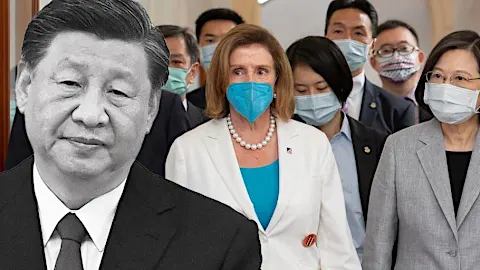Southeast Asian FMs warn of 'open conflicts' as Beijing starts live-fire drills

Chinese Foreign Minister Wang Yi attends the ASEAN Plus Three Foreign Ministers' Meeting in Phnom Penh on Aug. 4. © AP
PHNOM PENH -- China's Foreign Minister Wang Yi on Thursday hit out at U.S. House Speaker Nancy Pelosi's visit to Taiwan during his meeting with his Southeast Asian counterparts, who are wary of cross-strait tensions turning into "open conflicts."
In a statement by the Chinese Foreign Ministry, Wang said the visit was a "blatant provocation" and branded the U.S. the "biggest destroyer of peace in the Taiwan Strait and the biggest troublemaker for regional stability."
Wang also called Pelosi's Taiwan trip a "manic, irresponsible, and extremely irrational action" by the U.S.
Southeast Asian foreign ministers, in a statement on Thursday, said they were "concerned" about the ongoing cross-strait tensions, noting that they are occurring next door to Southeast Asia.
The Association of Southeast Asian Nations warned that the developments could "destabilize the region and eventually could lead to miscalculation, serious confrontation, open conflicts and unpredictable consequences among major powers."
China launched live-fire military drills in areas surrounding Taiwan on Thursday to demonstrate its fury over Pelosi's meeting with Taiwan President Tsai Ing-wen the previous day. Beijing had earlier imposed trade restrictions on Taipei.
China, which considers self-ruled Taiwan part of its territory, has fiercely opposed the visit, the first by a U.S. House speaker in 25 years, fearing it could embolden Taiwan to rebuff Beijing's reunification efforts.
In a separate meeting with ASEAN ministers on Thursday, U.S. Secretary of State Antony Blinken addressed the Taiwan issue. He said Washington remains committed to its "One China" policy and that it has reached out to Beijing "at every level of government" to ease tensions.
"I hope very much that Beijing will not manufacture a crisis or seek a pretext to increase its aggressive military activity," Blinken said.
"We and countries around the world believe that escalation serves no one and could have unintended consequences that serve no one's interests, including ASEAN members, and including China."
ASEAN has appealed for "maximum restraint," and urged parties to refrain from provocative actions. "We reiterate ASEAN member states' respective 'One China' policy," the 10-member bloc said.
Wang also met with Cambodian Prime Minister Hun Sen on Wednesday and discussed the issue. Wang said the "provocative act of the U.S. side on the Taiwan question is not accidental, but a carefully planned farce, which exposes its ugly face of treachery," Xinhua reported.
Cambodia, this year's ASEAN chair, is hosting a series of foreign ministerial meetings through Friday, when Wang and Blinken are likely to join the ASEAN Regional Forum security talks.
Southeast Asia is central to the U.S.-China strategic competition and Pelosi's visit to Taiwan became a key issue as the ASEAN foreign ministers opened their meetings on Wednesday.
In a statement the same day, Singapore said it hoped that the U.S. and China can "work out a modus vivendi, exercise self-restraint and refrain from actions that will further escalate tensions."
"Stable U.S.-China relations are vital for regional peace and prosperity," Singapore's Foreign Ministry said in a statement.














